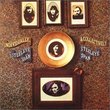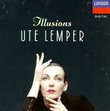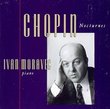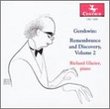| All Artists: Frederic Chopin, Martha Argerich Title: Chopin: 26 Préludes, etc / Martha Argerich Members Wishing: 0 Total Copies: 1 Label: Deutsche Grammophon Release Date: 6/14/1991 Genre: Classical Style: Number of Discs: 1 SwapaCD Credits: 1 UPC: 028943158428 |
Search - Frederic Chopin, Martha Argerich :: Chopin: 26 Préludes, etc / Martha Argerich
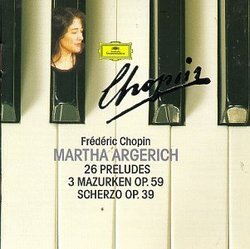 | Frederic Chopin, Martha Argerich Chopin: 26 Préludes, etc / Martha Argerich Genre: Classical
![header=[] body=[This CD is available to be requested as disc only.]](/images/attributes/disc.png?v=15401716) ![header=[] body=[This CD is unavailable to be requested with the disc and back insert at this time.]](/images/attributes/greyed_disc_back.png?v=15401716) ![header=[] body=[This CD is available to be requested with the disc and front insert.]](/images/attributes/disc_front.png?v=15401716) ![header=[] body=[This CD is unavailable to be requested with the disc, front and back inserts at this time.]](/images/attributes/greyed_disc_front_back.png?v=15401716) |
Larger Image |
CD DetailsSimilar CDs
Similarly Requested CDs
|
CD ReviewsIt's a question of temperament Anonymous | California USA | 12/21/1999 (5 out of 5 stars) "Is Chopin a romantic, mercurial, tempestuous composer? For me, definitely. That's why Argerich's performance of the Preludes speaks to me in a way no other performance does. She is so natural and spontaneous that all other versions seem ponderous and staid. If you're looking primarily for "dignity" in Chopin, you should probably try someone else." Absorbing,engaging and provocative readings scarecrow | Chicago, Illinois United States | 08/30/2000 (5 out of 5 stars) "It's like emoting through the eye of a needle to attempt to render new content, new interpretive insight to these preludes. Every pianist in the world,almost literally has played, them, Well! any pianist you would care to listen to. Argerich makes these works her own. Chopin was a craftsman, a lapidarian diamond-cutter of deep pain and anxiety. Miniature form was Chopin's primary language,saying the most with the least,yet giving a sense of profound scope,mists of the symphonic,as the works seem to transcend their formal boundaries and themselves,as in the repetitive chordal E-minor,with a plaintive,unassuming lone voice where the work cadences in the center. Chopin does run out of creativity at times opting to finalize some of these works with an organ-like chordal ending.Or clique-ish like sequential chordal patterns as in the Db major where a dark cloud in C#-minor is placed over the B section. But Boulez once said, it is difficult to jump into the unknown with both feet. One foot at a time is preferable.Argerich reveals a large emotive here,some of these preludes remain within a predetermined boundary, although roaring and shifting like a bull-at -the- gate gestures do abound in some as in the opening C-major. Listen to Kissin in the first prelude he displaces the rhythm of a simple broken chord. But Argerich can fly in the heavens as well in the G-major,etude-like for the left hand. Pollini is too clean and precise for the demeanor of these ,like the more exposed sentimentality,as in the G-major,or Ab major.In the dark ponderous Eb-minor here Argerich brings a nice shape,rather than an invitation for carnage. The G#-minor she lets loose the dance-like unrestrained fury. I lived with Argerich now for seven years playing these and I still always find some new content, I can't say that for Pollini. When Argerich knows when to shape and curtail her enragement,wonderful things happen. I've heard her self-indulged live Prokofiev,it wasn't a pretty site, more like an abbatoir.There is dignity here,if that's what you crave, but also a sense of Chopin the unique experimentor of miniature forms,like cathedrals drawn on postcards,or the details of the figurines we place on top of mantles,or shadow boxes,mere mists of piano timbre,as the Eb-minor,or the F# minor. Kissin also finds in Chopin the realm of the rule breaker." The Preludes as a Lightning Bolt Jeffrey Jones | Northern California, USA | 04/16/2005 (5 out of 5 stars) "Every pianist knows the Chopin Preludes, which stand even among his rich output as a cycle of unusually outstanding beauty, variety and mastery of chromaticism. They are played badly by so many novices, and indifferently by so many aspirants, that it is easy to make them sound stale. But Argerich's version has stood aside from all of that hubbub. It has been controversial since the beginning, with her most ardent admirers balanced by some equally militant detractors.
Is Argerich really defiling Chopin, as so many might suggest? I don't think so. Actually, I think that she succeeds brilliantly in making these pieces seem like just what they were in their time - groundbreaking. Chopin experienced the thrill of treading into unknown waters, exploring obscure and uncharted parts of the human psyche, and bringing it all up to the surface with the utmost concision. I cannot imagine how proud Chopin must have felt to have produced such a creation from his own pen. And it is extreme music - extremely rich, extremely stark, extremely happy, extremely sad, extremely advanced, extremely conservative. To Chopin's contemporaries, they seemed to come from nowhere, like a bolt of lightning. A soundscape as blindingly intense as the F-sharp minor Prelude still seems more like the music of another planet (to borrow a comment from Arrau about Debussy). Is it not appropriate, then, for Argerich to play them with the appropriate extremes of volume, of tempo, of warmth and coolness? Yes, I'm biased. Yes, there are some wrong notes in the B-flat minor Prelude (which certainly don't detract from the seemingly infinite power displayed) and there a few other places where newer editions, the Jan Ekier in particular, have made Chopin's intentions more clear. But the combination of burning, passionate music and burning, passionate pianist is unmatched. When it stops thrilling me, then I'll know I'm dead." |

 Track Listings (30) - Disc #1
Track Listings (30) - Disc #1

